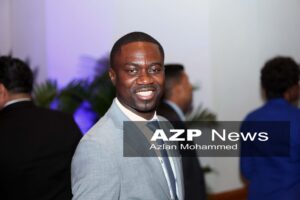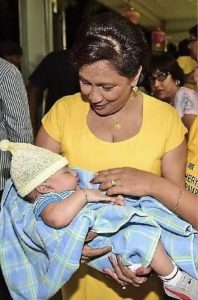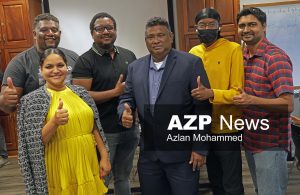By Sue-Ann Wayow
PERSONS living with Down syndrome should not be excluded from society just because they are born with an extra chromosome.
For this reason, the theme for this year’s World Down Syndrome Day (WDSD) in Inclusion Matters. WDSD is held every year on March 21.
Honorary Board Member of Down Syndrome Family Network Lisa Ghany said for the last ten years, the network promoted awareness of Down Syndrome and the human rights of persons with disabilities through the Lots of Socks Campaign.
Lots of Socks, a campaign founded by Down Syndrome International is a Global Awareness Campaign that has now become a major annual event in Trinidad and Tobago and is celebrated by schools, offices, non-governmental organisations ((NGOs), community groups and families of persons with Down syndrome throughout the country.
The idea was created because chromosomes are shaped “like socks” and people with Down syndrome have an extra copy of chromosome 21.
The network has thus far registered 293 persons living with Down Syndrome in Trinidad and Tobago.
Ghany said, “On World Down Syndrome Day we use our socks to create a conversation and to highlight issues affecting persons with disabilities so that we can educate and advocate with them for inclusion in every area of our society. This year the United Nations has chosen the theme #InclusionMatters and asks us to think about and discuss what inclusion means. When you rock your socks this year make sure and involve someone in a conversation and share the facts so we can correct the myths.”
The United Nations Convention on the Rights of Persons with Disabilities (UN CRPD) calls for full and effective participation and inclusion in society inclusive of quality and free primary education and secondary education on an equal basis with others, the opportunity to gain a living by work freely chosen or accepted in a labour market and work environment that is open, inclusive and accessible to persons with disabilities.
Trinidad and Tobago has been a signatory to the UN CRPD since 2015.
In 2019, the UN Secretary General adopted the United Nations Disability Inclusion Strategy (UN DIS). This provides a path towards disability inclusion through all areas of the work of the United Nations: peace and security, human rights, and development.
Around the world, it is widely accepted that everyone should have the same opportunities, be able to go to the same places, take part in the same activities, and enjoy the same experiences in life.
She said, “But the reality is that people with Down Syndrome and disabilities today do not benefit from full and effective participation and inclusion in society. There are many reasons for this. One reason is that there is a lack of agreed understanding of what inclusion is and what inclusive systems look like in practice.”
“So on 21 March 2022, we would like people with Down syndrome, families, advocates, professionals, organisations in Trinidad and Tobago to discuss what exactly inclusion means.
“In doing this, we can get a global conversation going, which will empower people around the world to advocate for full #Inclusion in society for people with Down syndrome and disabilities, and indeed for everyone,” Ghany said.
Ghany told AZP News, there was now a lobby for a national registry.
The organisations are also lobbying for more action on the part of stakeholders in Government with the ability to influence legislation for the protection of the human rights of persons with disabilities.
They hope to educate the public on misconceptions of persons with disabilities which would result in a different approach to acceptance and inclusion.
And, also to inspire families and persons with Down Syndrome and other disabilities to keep on being positive and to continue to challenge themselves to do more by creating a platform for them to speak out.
Myths and Truths about Down Syndrome provided by Ghany:
Myth: Down syndrome is a rare disorder.
Truth: Down syndrome is the most commonly occurring chromosomal condition. Approximately one in every 700 babies in the United States is born with Down Syndrome, or around 6,000 births per year.
Myth: Down syndrome is hereditary and runs in families.
Truth: Translocation, a type of Down Syndrome that accounts for 3 to 4% of all cases, is the only type of Down syndrome known to have a hereditary component. Of those, one third (or 1% of all cases of Down syndrome) are hereditary.
Myth: Most children with Down Syndrome are born to older parents.
Truth: Most children with Down Syndrome are born to women younger than 35 years old simply because younger women have more children. However, the likelihood of having a child with Down syndrome increases with the age of the mother, especially after age 35.
Myth: Parents will not find community support in bringing up their child with Down syndrome.
Truth: In Trinidad and Tobago the Down Syndrome Family Network is a parent support group directly involved in providing services to families of individuals with Down syndrome www.dsfamilynetwork.org other affiliates are ndss.org and Down Syndrome International and the National Down Syndrome Congress
Myth: All people with Down syndrome have a severe cognitive disability.
Truth: Most people with Down Syndrome have a mild to moderate cognitive disability, or intellectual disability. This is not indicative of the many strengths and talents that each individual possesses. Be considerate of the extra time it might take a person who has a disability to get things done or said.
Myth: People with Down Syndrome cannot be active members of their community.
Truth: People with Down Syndrome are active participants in educational, social and recreational activities. They are included in the typical education system and take part in sports, music, art programs and any other activities in the community.
People with Down Syndrome are valued members of their families and communities, and make meaningful contributions to society.
![]()













